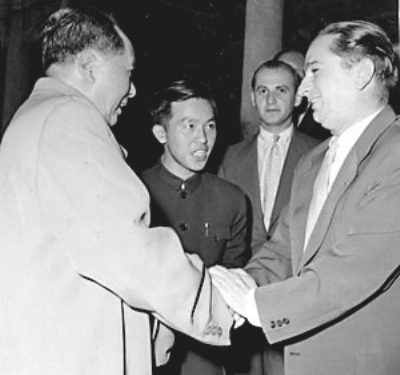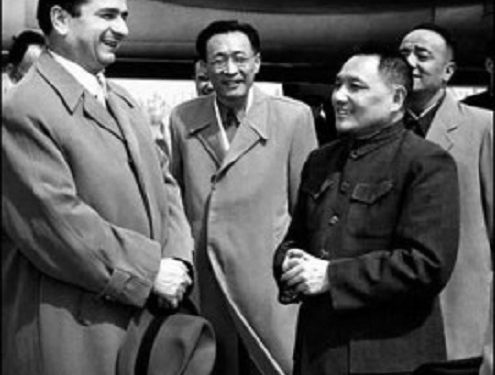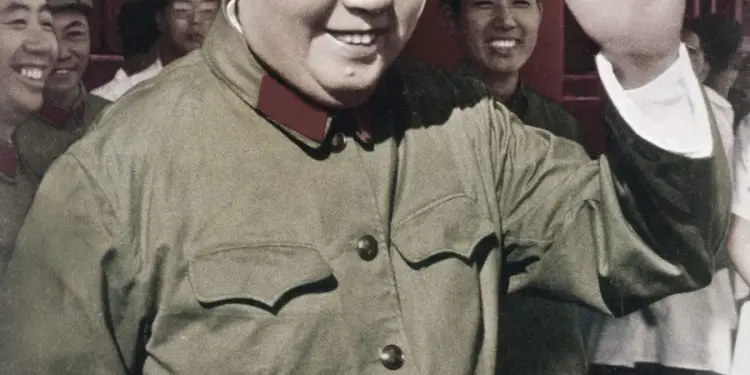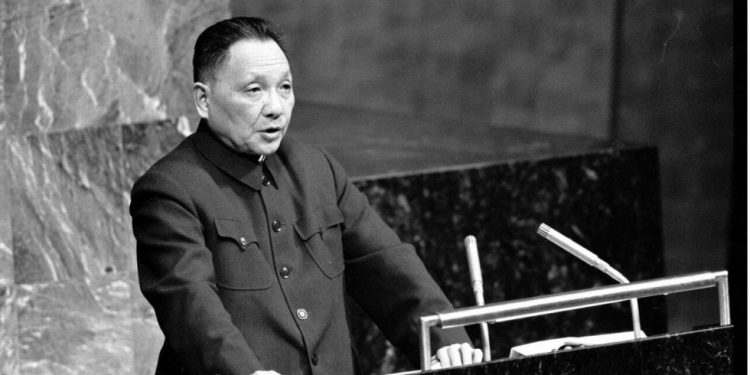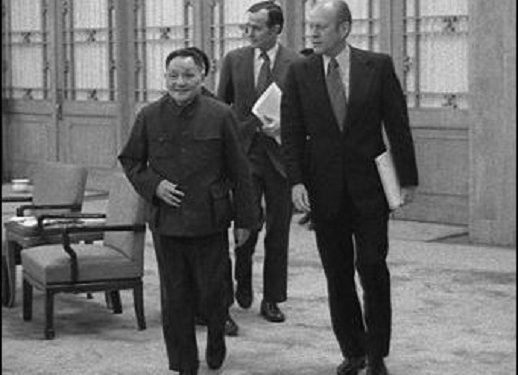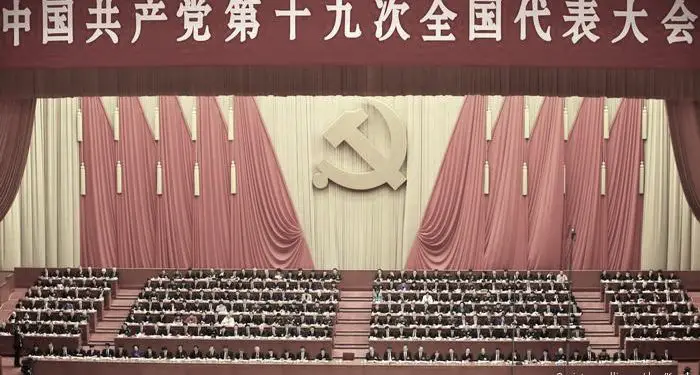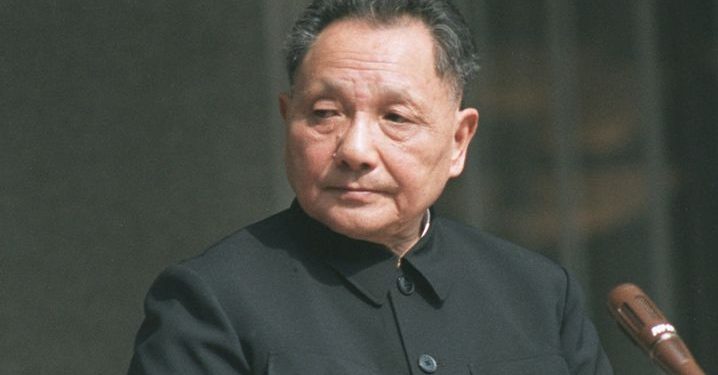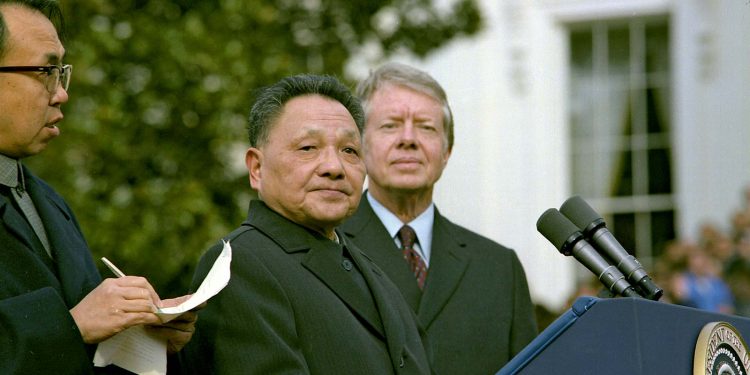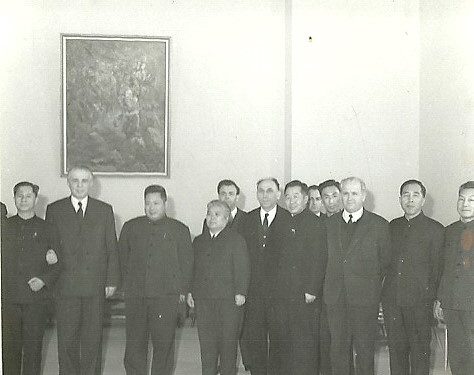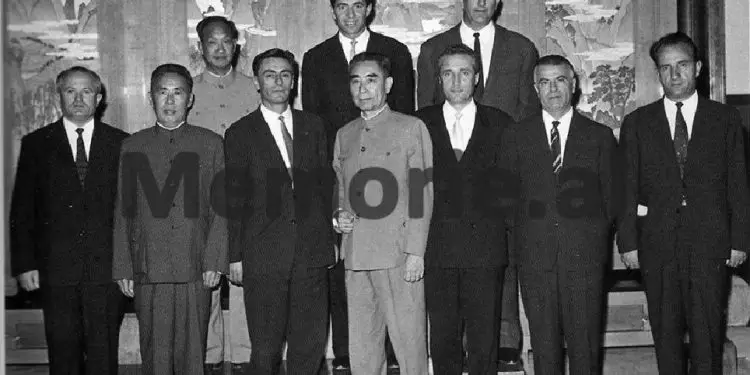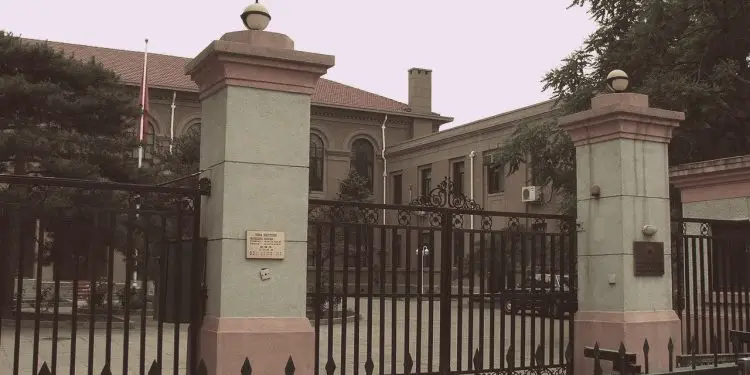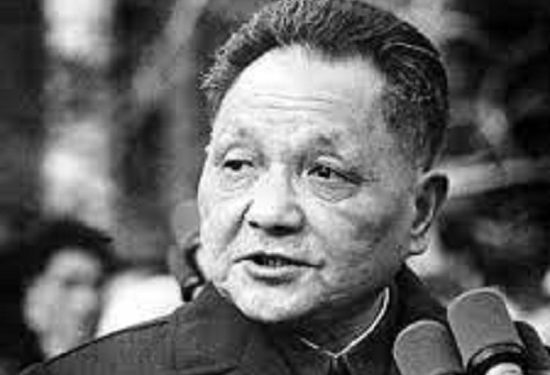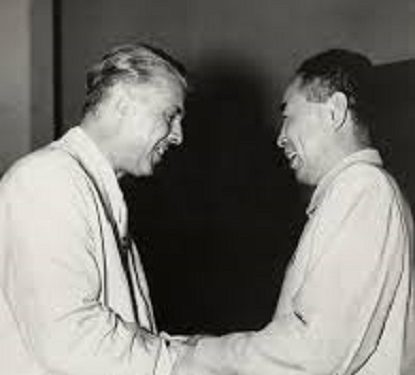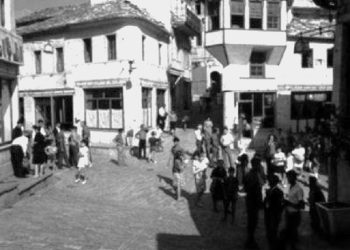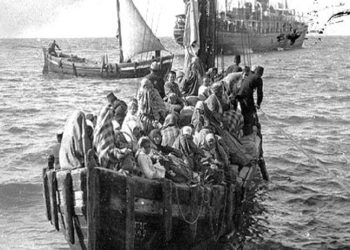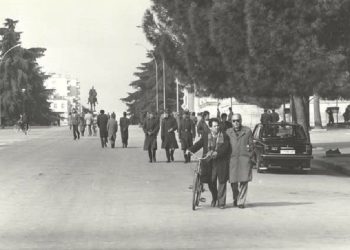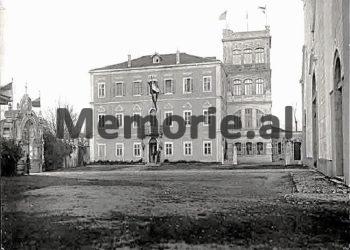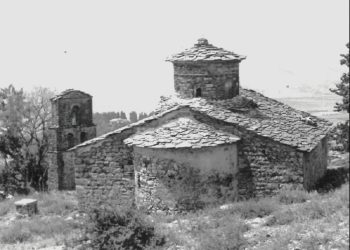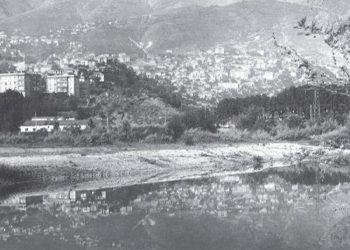Dashnor Kaloçi
Part fourteen
Memorie.al publishes an unknown document extracted from the Central State Archive in Tirana (fund of the former Central Committee of the ALP), which belongs to 1962, which contains the minutes of the meeting and talks held between a the delegation of the Albanian Labor Party led by the members of the Politburo and the secretaries of the Central Committee of the ALP, Hysni Kapo and Ramiz Alia, with a delegation of the Communist Party of the People’s Republic of China led by Ten Hsiao Pin and Van Tse Zian. The full minutes of the talks between the two delegations held on June 10, 1962 at the headquarters of the Central Committee of the Communist Party of China, (which was the fifth official meeting between them), where after the first item of the agenda which was also a priority, a possible meeting with Mao Zedong and finding opportunities and the itinerary of the Albanian delegation to return home by air and sea, was also discussed about the bilateral relations and economic assistance that official Tirana requested through the two leaders of Hysni Kapo and Ramiz Alia, such as the Nitrogen (Phosphate Fertilizer) Plant to be built in Fier, the Warsaw Pact talks, the KNER, NATO, Nikita Hurshov, China’s relations with its neighbors and other Asian countries, such as: Soviet Union, North Korea, South Korea, Japan, Mongolia, Taiwan, North Vietnam, South Vietnam, Cambodia, Laos, Indonesia, Nepal, Burma, India, Pakistan, Burundi, etc., to those of the Middle East and Africa, such as: Iran, Iraq, Syria, Egypt, Algeria, Guinea, Mali, Ghana, etc.
Minutes of the meeting of the delegation of the Albanian Labor Party led by Hysni Kapo and Ramiz Alia, with the delegation of the Communist Party of China, led by Ten Hsia Pin and Van Tse Zian, held in Beijing on June 10, 1962
The fifth official meeting between the delegation of the Albanian Labor Party and the delegation of the Chinese Communist Party.
(Held at the headquarters of the Central Committee of the Chinese Communist Party, at 9 a.m. on June 10, 1962)
Continued from the previous issue
Comrade Ten Hsiao Pin: There is a division in the heart of the Burmese army; one side wants to follow a pro-Japanese orientation, another, including We Win, wants to continue on the path of neutrality and wants Burma to have good relations with us. The Ne Win government is not doing well with Nehru and Thailand, and this war has already begun. Now in Burma there are efforts to create a united party.
Further west of us is Nepal. This is an anti-Indian country. The King of Nepal maintains good relations with us; he is not bad and on his initiative, we finally resolved the Sino-Nepalese border issue.
In Nepal they will build a paved road to our Tibet. In other words, Nepal is seeking to secede from Indian control. Nepal is also doing well with Pakistan. The Nepalese know full well that we have nothing against them and that the threat to their country comes from the Indian leadership.
We maintain neutral relations with Iraq; they are neither warm nor cold. The problems in the Arab world are very complicated. Egyptian President Gamal Abdel Nasser and Iraq are trying to establish their hegemony over the Arab world. The Soviet Union has made significant investments in Iraq, but Iraq’s relations with us are not bad either.
The United Arab Republic also has good relations with us. New Syria’s relations with us are not bad either. We have neutral relations with all these countries. Our policy with these countries is not to interfere in their internal affairs. I also want to emphasize that Nasser does not have very good relations with the Soviet Union.
Some African countries have very good relations with us, such as Guinea, Mali, Ghana, etc. President Ghana Kwame Nkrumah is not a leftist element; Mali and Guinea. […]
Also, those countries in Africa that have some form of formal independence maintain good relations with us. The people of these countries believe that China is anti-imperialist, that it actively supports their struggle for full independence, and that China does not take subversive actions against them.
Overall, these are our relationships with non-governing countries.
Our relations with Indonesia are very good because the Communist Party of Indonesia has done a lot of work in this regard. Problems left over from the past, such as the issue of Chinese immigrants in Indonesia, were resolved through efforts on both sides. Our country is one of the first to come out in support of the national liberation war of the Indonesian people.
As for relations with European countries, you already know the situation.
In Yugoslavia, some time ago, a meeting of the presidents of non-ruling countries was held. The meeting was also attended by some leftists, such as Sukarno, representatives of Mali, Cuba and Guinea, although Guinea’s President Sékou Touré did not go there alone. Nasser and the Ghanaian representative also took a good position in that meeting. The worst position taken there was from India and Burma of U Nu, which is a pro-Indian element.
The relationship between U Nu and Nehru was like the relationship between the student and his teacher. U Nu would seek the opinion of Nehru on all the most important issues. Despite this, U Nu has not interfered in Sino-Indian relations. But We Win is different from U Nu, We Win is anti-Indian. Next, after We Win in Burma is Brigadier General An Ti, who is not of good character, he is pro-Japanese.
This is what I had to say.
Comrade Hysni Kapo: We find this analysis of Comrade Deng Xiaoping very interesting and we will make sure to pass it on to our Central Committee. I wanted to add that there is a lot of interest in our country from Arab countries; in fact some countries in Africa are also interested in our country.
Comrade Ten Hsiao Pin: You are a Muslim country, so you can do a lot of good work with the Muslim countries of Africa.
Comrade Hysni Kapo: We are receiving some requests for sharing experience from some of the African countries; they seek help with specialists and want to send students to our country. We will see what kind of assistance we can give to these countries within our capacity, always keeping in mind the objective of strengthening relations with these countries by following an accurate course.
We also have in mind what Comrade Deng Xiaoping told us about not interfering in the internal affairs of other countries; we have no deviant objectives. Starting from our common goals in the fight against imperialism, we have used this perspective and continue to do so in our relations with Arab countries, as well as in those with African countries. As for the position of the Yugoslav revisionists towards these countries, it is well known that they are trying to be active in them.
We always keep this in mind in our work. Wherever possible, we fight, with our steadfast position, against the activities of the Yugoslav revisionists in these countries. They are waging a war in Africa in general, but also against us in particular, but we are working hard with these countries so that they can understand what our true position is.
Comrade Ten Hsiao Pin: You are standing on the ground correctly. It may be possible for us to increase our work in Africa because there we have bases such as Algeria. Our relations with Yemen are also very good. The King of Yemen is better than the revisionists.
Comrade Hysni Kapo: In our work in these countries we are finding difficulties with the means of propaganda. We will look more closely at our capacity for activity and if necessary, we will also come and talk to you and if this is something that is of interest to both of us, you can even help us with this field.
In fact, you are already helping us a lot with propaganda tools, not only with radio equipment, but also with many others, such as our magazines and other literature, which is published to be distributed in other countries.
Comrade Ten Hsiao Pin: It has been our experience since when working with African countries, one thing matters a lot: the people in Africa are very sharp because they have felt the yoke of imperialism for a long time. This is why it is not an easy thing to gain their trust. First, the African trusts only in people who do not interfere in his internal affairs; then trust increases if one does not receive anything from them.
I am talking here especially about us as a great power. This is why we do not rush into our actions towards them; we do not make many gestures, and always take into account their difficulties. We also develop our propaganda activity to a level that may be acceptable to them, to a level that they themselves will accept. We think it is correct to work this way. If someone rushes to his work, if someone shows a lot of activity towards them, they may create suspicions about you.
Comrade Hysni Kapo: That’s right, we agree.
Comrade Ten Hsiao Pin: This is our opinion on these matters.
What should we talk about now, the relationship between our two parties?
Comrade Hysni Kapo: We want the communication between our two parties to be more frequent, because it would be much better.
Comrade Ten Hsiao Pin: That’s correct. We do not have opposing views on this. We have had plenty of contact through our ambassadors. The difficulty with us is the exchange of visits by the leaders of both sides, but little by little we will also create the conditions for this. It will be much better when we solve the communication (travel) problem and we are actively working on it.
When we thought about this, we were not just thinking about the need for better relations with Albania, because, in addition to you, we also have the issues of Africa, Europe and Latin
America. It is necessary for us to have an air route in the southern direction. Either way, it will take some time to create such a line.
Comrade Hysni Kapo: What Comrade Ten Hsiao Pin said is correct; the best course for relations between our two countries at the moment is through our ambassadors. However, many issues can be better resolved through direct contact.
Comrade Ten Hsiao Pin: Therefore it is better to have direct meetings.
Comrade Hysni Kapo: Not only should we have them, but these meetings should be as frequent as possible. Who would not want to meet face to face ?! First, because it is good for work issues, but also because it gives us a chance to be seen.
Comrade Ten Hsiao Pin: These are exactly our feelings.
Comrade Hysni Kapo: I have another question. We do not know anything about the conclusions of the last meeting of the Economic Council (KNER) and the Warsaw Pact of the socialist countries of Europe.
Comrade Ten Hsiao Pin: We do not know anything either. They have communicated to the correspondents of the newspapers only a few insignificant things. We were waiting for them to discuss, for example, the letter that the USSR Central Committee of the USSR would send us. They, of course, must have discussed economic cooperation between them.
This is indicated by a brief notice we received from them in Russian. We just got it, and it has not been translated yet. We will give you a copy of it. But this material was sent to us only as a formality. Something of interest from that meeting is that Mongolia attended the meeting of the Mutual Economic Assistance Council (MICC).
Comrade Ramiz Alia: How do friends see this; what were the objectives for him?
Comrade Ten Hsiao Pin: The aim is to open a door for the socialist countries of East Asia and exclude Albania. But it should be noted that the Economic Council (ICRC) is not the same as the Warsaw Pact.
We have not said anything about this matter; we are turning a deaf ear and a blind eye towards him. They have also sent us an invitation to attend the Economic Council (KNER) meeting at an observer level.
Comrade Ramiz Alia: And despite that you did not take part in it. It seems they are inviting you to prepare the ground and so that they can be able to say later, whenever the time is more profitable, look at who is not on the cooperative side.
Comrade Ten Hsiao Pin: We do not pay much attention to this, but you have the right to protest because you are a member of KNER.
Comrade Ramiz Alia: As you have seen, our government has made a statement on the COMECON meeting, as well as on the Warsaw Pact.
Comrade Deng Ten Hsiao Pin: Our position on these things is not to pay too much attention to them and we have only published a very small and insignificant note in the newspapers about these meetings. If you pay more attention to them, their importance increases.
I think that is enough talk on these issues for today; we will have more time to talk. You will talk to our friends about your plans in China, in other words, if you want to visit abroad or stay in Beijing. As you return from your visits, we will invite you to a dinner. /Memorie.al




